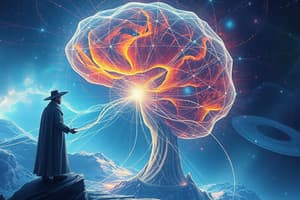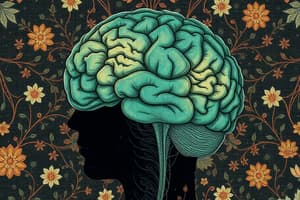Podcast
Questions and Answers
Match the following types of memory with their characteristics:
Match the following types of memory with their characteristics:
Sensory Memory = Very short-term storage Short-term Memory = Limited storage capacity Working Memory = Experience of consciousness Long-term Memory = Virtually unlimited storage
Match the following memory-related concepts with their descriptions:
Match the following memory-related concepts with their descriptions:
Miller's Magic Number = Seven plus or minus two Chunking = Basic memory units Acoustic Sensory Memory = Holding last words in head Rehearsal = Maintaining information briefly
Match the following memory processes with their examples:
Match the following memory processes with their examples:
Sensory Memory = Afterimage of a lightning flash Short-term Memory = Remembering a phone number temporarily Long-term Memory = Recognizing faces over time Working Memory = Understanding how the world works
Match the following terms with their relevance to memory:
Match the following terms with their relevance to memory:
Match the following memory types with their storage duration:
Match the following memory types with their storage duration:
Match the following types of rehearsal with their functions:
Match the following types of rehearsal with their functions:
Match the following mnemonic strategies with their descriptions:
Match the following mnemonic strategies with their descriptions:
Match the following examples with their memory types:
Match the following examples with their memory types:
Match the type of memory with its description:
Match the type of memory with its description:
Match the stages of memory processing with their definitions:
Match the stages of memory processing with their definitions:
Match the type of memory task with its description:
Match the type of memory task with its description:
Match the memory types with their duration:
Match the memory types with their duration:
Match the memory retrieval methods with their examples:
Match the memory retrieval methods with their examples:
Match the characteristic of memory with its appropriate type:
Match the characteristic of memory with its appropriate type:
Match the form of memory with its example:
Match the form of memory with its example:
Match the term with its related memory process:
Match the term with its related memory process:
Match the aspect of memory with its relevance:
Match the aspect of memory with its relevance:
Match the type of episodic memory with its context:
Match the type of episodic memory with its context:
What is the primary difference between implicit memory and explicit memory?
What is the primary difference between implicit memory and explicit memory?
Which of the following best describes episodic memory?
Which of the following best describes episodic memory?
What does the process of encoding refer to in memory?
What does the process of encoding refer to in memory?
How does recall differ from recognition in memory retrieval?
How does recall differ from recognition in memory retrieval?
Which of the following statements about long-term memory is accurate?
Which of the following statements about long-term memory is accurate?
Semantic memory is best defined as:
Semantic memory is best defined as:
Which type of memory is primarily involved when recalling what you had for breakfast this morning?
Which type of memory is primarily involved when recalling what you had for breakfast this morning?
What characterizes sensory memory?
What characterizes sensory memory?
Which of the following describes the retrieval method of recognition?
Which of the following describes the retrieval method of recognition?
In which situation would you likely use recall rather than recognition?
In which situation would you likely use recall rather than recognition?
What is the primary function of short-term memory?
What is the primary function of short-term memory?
How can one increase their short-term memory capacity, according to the concept of chunks?
How can one increase their short-term memory capacity, according to the concept of chunks?
Which of the following statements about long-term memory is correct?
Which of the following statements about long-term memory is correct?
What is the 'magic number' proposed by George Miller regarding short-term memory capacity?
What is the 'magic number' proposed by George Miller regarding short-term memory capacity?
What role does rehearsal play in short-term memory?
What role does rehearsal play in short-term memory?
How does working memory relate to consciousness?
How does working memory relate to consciousness?
Which of the following exemplifies the concept of sensory memory?
Which of the following exemplifies the concept of sensory memory?
What happens to information that is not rehearsed in short-term memory?
What happens to information that is not rehearsed in short-term memory?
Which technique might improve memory retention for someone who knows little about a subject?
Which technique might improve memory retention for someone who knows little about a subject?
How does expertise influence memory capacity?
How does expertise influence memory capacity?
Episodic memory refers to facts that we know, like the capital of Canada.
Episodic memory refers to facts that we know, like the capital of Canada.
Implicit memory is related to what you consciously recognize and recall.
Implicit memory is related to what you consciously recognize and recall.
Recall is the process of identifying the correct answer from given options.
Recall is the process of identifying the correct answer from given options.
Memory retrieval can occur through both recall and recognition methods.
Memory retrieval can occur through both recall and recognition methods.
Sensory memory has a longer duration than long-term memory.
Sensory memory has a longer duration than long-term memory.
Explicit memory is what you consciously know, while ______ memory refers to information you may not be aware of.
Explicit memory is what you consciously know, while ______ memory refers to information you may not be aware of.
Encoding, storage, and ______ are the three main processes involved in memory.
Encoding, storage, and ______ are the three main processes involved in memory.
______ memory refers to facts and information you have learned, such as the capital of a country.
______ memory refers to facts and information you have learned, such as the capital of a country.
Recall involves freely recounting experiences, while ______ means selecting the correct answer from options provided.
Recall involves freely recounting experiences, while ______ means selecting the correct answer from options provided.
Sensory memory, short-term memory, and ______ memory are the three distinct types of memory.
Sensory memory, short-term memory, and ______ memory are the three distinct types of memory.
Flashcards are hidden until you start studying
Study Notes
Memory Overview
- Memory is essential for knowledge retention and encompasses more than just autobiographical recollection.
- The contrast often drawn between memory loss scenarios typically emphasizes autobiographical memory, neglecting the broader components of memory.
Types of Memory
- Explicit Memory: Conscious knowledge, such as personal information and facts (e.g., knowing your name).
- Implicit Memory: Unconscious knowledge, demonstrated through skills and feelings without direct recall (e.g., navigation in a familiar area).
Categories of Memory
- Semantic Memory: Recollection of facts and concepts (e.g., knowing the capital of Canada).
- Episodic Memory: Recollection of personal experiences and specific events throughout one’s life.
Memory Processes
- Encoding: The initial process that transforms information into a format for storage in the brain.
- Storage: Maintaining encoded information over time.
- Retrieval: Accessing stored information for use.
Types of Recall
- Recall: The ability to retrieve information without cues (e.g., answering a question about past events).
- Recognition: Identifying correct information from a set of options (e.g., multiple-choice questions).
Memory Systems
- Sensory Memory: Very brief retention of sensory information (e.g., afterimage from a flash of lightning).
- Short-Term Memory/Working Memory: Temporary storage that enables manipulation of information; quickly lost without rehearsal.
- Long-Term Memory: Extensive storage capacity for a wide array of information over long periods.
Memory Capacity and Limitations
- Short-term memory is limited, often cited as seven plus or minus two items (George Miller’s "magic number").
- Chunks: Basic units of memory organization that group information into manageable pieces, enhancing retention.
Expertise and Memory
- Memory performance improves with knowledge and expertise.
- Experts can memorize complex information efficiently by recognizing patterns and structures relevant to their field (e.g., chess positions, football diagrams).
Conclusion
- Understanding memory involves recognizing its complexity, including types, processes, limitations, and the influence of expertise on memory efficiency.
Memory Overview
- Memory is essential for knowledge retention and encompasses more than just autobiographical recollection.
- The contrast often drawn between memory loss scenarios typically emphasizes autobiographical memory, neglecting the broader components of memory.
Types of Memory
- Explicit Memory: Conscious knowledge, such as personal information and facts (e.g., knowing your name).
- Implicit Memory: Unconscious knowledge, demonstrated through skills and feelings without direct recall (e.g., navigation in a familiar area).
Categories of Memory
- Semantic Memory: Recollection of facts and concepts (e.g., knowing the capital of Canada).
- Episodic Memory: Recollection of personal experiences and specific events throughout one’s life.
Memory Processes
- Encoding: The initial process that transforms information into a format for storage in the brain.
- Storage: Maintaining encoded information over time.
- Retrieval: Accessing stored information for use.
Types of Recall
- Recall: The ability to retrieve information without cues (e.g., answering a question about past events).
- Recognition: Identifying correct information from a set of options (e.g., multiple-choice questions).
Memory Systems
- Sensory Memory: Very brief retention of sensory information (e.g., afterimage from a flash of lightning).
- Short-Term Memory/Working Memory: Temporary storage that enables manipulation of information; quickly lost without rehearsal.
- Long-Term Memory: Extensive storage capacity for a wide array of information over long periods.
Memory Capacity and Limitations
- Short-term memory is limited, often cited as seven plus or minus two items (George Miller’s "magic number").
- Chunks: Basic units of memory organization that group information into manageable pieces, enhancing retention.
Expertise and Memory
- Memory performance improves with knowledge and expertise.
- Experts can memorize complex information efficiently by recognizing patterns and structures relevant to their field (e.g., chess positions, football diagrams).
Conclusion
- Understanding memory involves recognizing its complexity, including types, processes, limitations, and the influence of expertise on memory efficiency.
Memory Overview
- Memory is essential for knowledge retention and encompasses more than just autobiographical recollection.
- The contrast often drawn between memory loss scenarios typically emphasizes autobiographical memory, neglecting the broader components of memory.
Types of Memory
- Explicit Memory: Conscious knowledge, such as personal information and facts (e.g., knowing your name).
- Implicit Memory: Unconscious knowledge, demonstrated through skills and feelings without direct recall (e.g., navigation in a familiar area).
Categories of Memory
- Semantic Memory: Recollection of facts and concepts (e.g., knowing the capital of Canada).
- Episodic Memory: Recollection of personal experiences and specific events throughout one’s life.
Memory Processes
- Encoding: The initial process that transforms information into a format for storage in the brain.
- Storage: Maintaining encoded information over time.
- Retrieval: Accessing stored information for use.
Types of Recall
- Recall: The ability to retrieve information without cues (e.g., answering a question about past events).
- Recognition: Identifying correct information from a set of options (e.g., multiple-choice questions).
Memory Systems
- Sensory Memory: Very brief retention of sensory information (e.g., afterimage from a flash of lightning).
- Short-Term Memory/Working Memory: Temporary storage that enables manipulation of information; quickly lost without rehearsal.
- Long-Term Memory: Extensive storage capacity for a wide array of information over long periods.
Memory Capacity and Limitations
- Short-term memory is limited, often cited as seven plus or minus two items (George Miller’s "magic number").
- Chunks: Basic units of memory organization that group information into manageable pieces, enhancing retention.
Expertise and Memory
- Memory performance improves with knowledge and expertise.
- Experts can memorize complex information efficiently by recognizing patterns and structures relevant to their field (e.g., chess positions, football diagrams).
Conclusion
- Understanding memory involves recognizing its complexity, including types, processes, limitations, and the influence of expertise on memory efficiency.
Memory Overview
- Memory is essential for knowledge retention and encompasses more than just autobiographical recollection.
- The contrast often drawn between memory loss scenarios typically emphasizes autobiographical memory, neglecting the broader components of memory.
Types of Memory
- Explicit Memory: Conscious knowledge, such as personal information and facts (e.g., knowing your name).
- Implicit Memory: Unconscious knowledge, demonstrated through skills and feelings without direct recall (e.g., navigation in a familiar area).
Categories of Memory
- Semantic Memory: Recollection of facts and concepts (e.g., knowing the capital of Canada).
- Episodic Memory: Recollection of personal experiences and specific events throughout one’s life.
Memory Processes
- Encoding: The initial process that transforms information into a format for storage in the brain.
- Storage: Maintaining encoded information over time.
- Retrieval: Accessing stored information for use.
Types of Recall
- Recall: The ability to retrieve information without cues (e.g., answering a question about past events).
- Recognition: Identifying correct information from a set of options (e.g., multiple-choice questions).
Memory Systems
- Sensory Memory: Very brief retention of sensory information (e.g., afterimage from a flash of lightning).
- Short-Term Memory/Working Memory: Temporary storage that enables manipulation of information; quickly lost without rehearsal.
- Long-Term Memory: Extensive storage capacity for a wide array of information over long periods.
Memory Capacity and Limitations
- Short-term memory is limited, often cited as seven plus or minus two items (George Miller’s "magic number").
- Chunks: Basic units of memory organization that group information into manageable pieces, enhancing retention.
Expertise and Memory
- Memory performance improves with knowledge and expertise.
- Experts can memorize complex information efficiently by recognizing patterns and structures relevant to their field (e.g., chess positions, football diagrams).
Conclusion
- Understanding memory involves recognizing its complexity, including types, processes, limitations, and the influence of expertise on memory efficiency.
Studying That Suits You
Use AI to generate personalized quizzes and flashcards to suit your learning preferences.



